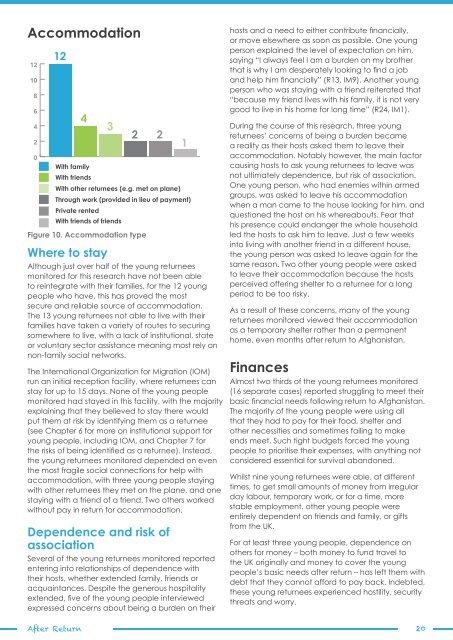After Return
After%20Return_RSN_April%202016
After%20Return_RSN_April%202016
You also want an ePaper? Increase the reach of your titles
YUMPU automatically turns print PDFs into web optimized ePapers that Google loves.
Accommodation<br />
12<br />
10<br />
8<br />
6<br />
4<br />
2<br />
0<br />
12<br />
4<br />
3<br />
With family<br />
With friends<br />
With other returnees (e.g. met on plane)<br />
Through work (provided in lieu of payment)<br />
Private rented<br />
With friends of friends<br />
Figure 10. Accommodation type<br />
Where to stay<br />
2 2<br />
Although just over half of the young returnees<br />
monitored for this research have not been able<br />
to reintegrate with their families, for the 12 young<br />
people who have, this has proved the most<br />
secure and reliable source of accommodation.<br />
The 13 young returnees not able to live with their<br />
families have taken a variety of routes to securing<br />
somewhere to live, with a lack of institutional, state<br />
or voluntary sector assistance meaning most rely on<br />
non-family social networks.<br />
The International Organization for Migration (IOM)<br />
run an initial reception facility, where returnees can<br />
stay for up to 15 days. None of the young people<br />
monitored had stayed in this facility, with the majority<br />
explaining that they believed to stay there would<br />
put them at risk by identifying them as a returnee<br />
(see Chapter 6 for more on institutional support for<br />
young people, including IOM, and Chapter 7 for<br />
the risks of being identified as a returnee). Instead,<br />
the young returnees monitored depended on even<br />
the most fragile social connections for help with<br />
accommodation, with three young people staying<br />
with other returnees they met on the plane, and one<br />
staying with a friend of a friend. Two others worked<br />
without pay in return for accommodation.<br />
Dependence and risk of<br />
association<br />
Several of the young returnees monitored reported<br />
entering into relationships of dependence with<br />
their hosts, whether extended family, friends or<br />
acquaintances. Despite the generous hospitality<br />
extended, five of the young people interviewed<br />
expressed concerns about being a burden on their<br />
1<br />
hosts and a need to either contribute financially,<br />
or move elsewhere as soon as possible. One young<br />
person explained the level of expectation on him,<br />
saying “I always feel I am a burden on my brother<br />
that is why I am desperately looking to find a job<br />
and help him financially” (R13, IM9). Another young<br />
person who was staying with a friend reiterated that<br />
“because my friend lives with his family, it is not very<br />
good to live in his home for long time” (R24, IM1).<br />
During the course of this research, three young<br />
returnees’ concerns of being a burden became<br />
a reality as their hosts asked them to leave their<br />
accommodation. Notably however, the main factor<br />
causing hosts to ask young returnees to leave was<br />
not ultimately dependence, but risk of association.<br />
One young person, who had enemies within armed<br />
groups, was asked to leave his accommodation<br />
when a man came to the house looking for him, and<br />
questioned the host on his whereabouts. Fear that<br />
his presence could endanger the whole household<br />
led the hosts to ask him to leave. Just a few weeks<br />
into living with another friend in a different house,<br />
the young person was asked to leave again for the<br />
same reason. Two other young people were asked<br />
to leave their accommodation because the hosts<br />
perceived offering shelter to a returnee for a long<br />
period to be too risky.<br />
As a result of these concerns, many of the young<br />
returnees monitored viewed their accommodation<br />
as a temporary shelter rather than a permanent<br />
home, even months after return to Afghanistan.<br />
Finances<br />
Almost two thirds of the young returnees monitored<br />
(16 separate cases) reported struggling to meet their<br />
basic financial needs following return to Afghanistan.<br />
The majority of the young people were using all<br />
that they had to pay for their food, shelter and<br />
other necessities and sometimes failing to make<br />
ends meet. Such tight budgets forced the young<br />
people to prioritise their expenses, with anything not<br />
considered essential for survival abandoned.<br />
Whilst nine young returnees were able, at different<br />
times, to get small amounts of money from irregular<br />
day labour, temporary work, or for a time, more<br />
stable employment, other young people were<br />
entirely dependent on friends and family, or gifts<br />
from the UK.<br />
For at least three young people, dependence on<br />
others for money – both money to fund travel to<br />
the UK originally and money to cover the young<br />
people’s basic needs after return – has left them with<br />
debt that they cannot afford to pay back. Indebted,<br />
these young returnees experienced hostility, security<br />
threats and worry.<br />
<strong>After</strong> <strong>Return</strong> 20


